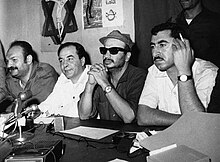This is an old revision of this page, as edited by Egeymi (talk | contribs) at 07:36, 22 October 2023 (→Political life: added 1 wl). The present address (URL) is a permanent link to this revision, which may differ significantly from the current revision.
Revision as of 07:36, 22 October 2023 by Egeymi (talk | contribs) (→Political life: added 1 wl)(diff) ← Previous revision | Latest revision (diff) | Newer revision → (diff) Palestinian writer and political leader (1924–1973)
| Kamal Nasser | |
|---|---|
| Born | Kamal Butros Nasser 1924 Gaza, Mandatory Palestine |
| Died | 10 April 1973(1973-04-10) (aged 47–48) Beirut, Lebanon |
| Nationality | Palestinian |
| Alma mater | Bir Zeit University American University of Beirut |
| Occupation(s) | Political leader, writer, poet |

Kamal Butros Nasser (Template:Lang-ar; 1924 – 9 or 10 April 1973) was a Palestinian political leader, writer and poet. In the early 1970s, Nasser was the spokesman of the Palestinian Liberation Organization.
Early life
Nasser was born in Gaza in 1924, and grew up in Birzeit. He was educated at Bir Zeit school (now Bir Zeit University). Then he studied political science at the American University of Beirut and graduated in 1945. Later he worked as a teacher while studying law in Jerusalem, then taught at Al-Ahlia College in Ramallah. In the period following the 1948 Palestine War, Nasser worked as a journalist.
Political life
Nasser was responsible for producing the al-Ba‘ath newspaper from Ramallah and also set up al-Jil al-Jadid (The New Era), a militant newspaper. In 1956 he was elected to Jordanian parliament as Ba‘ath member for Ramallah district. He did not serve out his term as a result of his expulsion from Parliament during the subsequent martial law period in Jordan. Expelled from West Bank by Israel in 1967, Nasser became editor of the PLO periodical, Falastin Al Thawra, in 1972. In addition, at that time he became a member of PLO Executive Committee from February 1969 to July 1971 serving as an official with the office of National Guidance. In 1970, he was also spokesman for the committee. In addition, he served as spokesman for the PLO. From 1969 to 1973, Nasser was head of the PLO's media and information efforts.
Death
Nasser was killed in West Beirut on the night of 9 April 1973 by Israeli special forces during an Israeli raid on Lebanon along with Kamal Adwan and Mohammed Yousef Najjar. All three men were included in Mossad's target list for their alleged participation in the Munich massacre.
Legacy
The main auditorium of Birzeit University is named after him.
Works
Nasser was a published poet and a number of his poems have been translated into English, including The Story and The Last Poem.
References
- ^ "Remembering Kamal Nasser on the 45th anniversary of Land Day". Birzeit University. 30 March 2021. Retrieved 15 September 2023.
- "Hawks threaten to leave government if peace proposals are accepted". Ludington Daily News. UPI. 29 July 1970. Retrieved 16 December 2012.
- "Troops strike". Gadsden Times. 10 April 1973. Retrieved 16 December 2012.
- Jensen, Holger (11 April 1973). "Beirut incident daring Mideast exploit". Times Daily. Beirut. Associated Press. Retrieved 16 December 2012.
- Loch K. Johnson, Strategic Intelligence, Praeger Security International, 2006, p.67.
- Aaron Klein, Striking Back: The 1972 Munich Olympics Massacre and Israel's Deadly Response, Random House, 2007, p.164.
- "Kamal Nasser Poems - Poems of Kamal Nasser". Poem Hunter. Retrieved 21 April 2021.
- 20th-century male writers
- 20th-century Palestinian poets
- 1925 births
- 1973 deaths
- American University of Beirut alumni
- Assassinated Palestinian politicians
- Mossad assassinations following the Munich massacre
- People killed in Mossad operations
- Palestinian Arab nationalists
- Palestinian Christians
- Palestinian male poets
- Palestinian writers
- People from Gaza City
- 1970s assassinated politicians in Asia
- Fatah members
- Assassinated Palestinian journalists